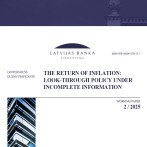Fuel: the main factor in dropping consumer prices in May
The rise in consumer prices has abated and their average level went down 0.2% in May, with the annual inflation thus dropping to 2.2%.
The drop in fuel prices had the most substantial effect on the drops in the monthly and annual inflation figures. Albeit with uncertain results, negotiations between world powers and Iran continued peacefully on nuclear armaments with further resolution postponed for mid-June. Oil prices in the meantime continued to drop. The origins of the fluctuations in oil prices, however, cover a wide geography of political and economic factors to which the oil market reacts relatively quickly and that is why it is too early to evaluate the nature of this drop in prices.
The prices of the so-called other tradable goods dropped more than expected over a month: the drops were mostly observed in the disposable household goods, several categories of rest- and culture-related goods as well as, e.g. tourism service prices. The annual core inflation dropped substantially as a result. The drop in May was fostered also by a smaller effect of the prices of processed foods than in April and food prices partially followed the world food price dynamics. According to the UN Food and Agriculture Organization data, the global food prices in May dropped more than 4%, with the prices of milk products (11.6%) and sugar (9.1%) topping the list. Since the beginning of the year, the milk procurement prices have been dropping in Latvia as well, but they are only partially reflected in the producer and consumer prices. Overall, the prices of unprocessed foods dropped slightly in May, impacted by the end of the egg price hikes, whereas the prices of processed foods rose slightly, primarily on account of the prices of non-alcoholic beverages and meat.
No rise in administered prices was observed in May of this year and the rate of their annual rise dropped impacted by the base (in May 2011 the thermal energy prices had risen).
Albeit the prices of oil products are currently going down, the average values over a longer period continue high. Thus, in addition to the fact that A/S "Rīgas Siltums" has transferred the effect of last year's rise in excise tax to the thermal energy prices as of June, rises in both natural gas and thermal energy prices could be expected in July under the impact of the 9-month average of heavy fuel prices. That however will be compensated by the dissipation of the base effects of the indirect taxes raised last year and will be positively influenced by the expected cut in the VAT from 22% to 21%. The impact of demand on inflation is also not expected to increase substantially: it is limited by both the balanced rises in salaries and productivity and the level of economic activity, which, because of the weaker external demand could rise at a more moderate rate than before. In the coming months the level of annual inflation is therefore likely to drop gradually.
Textual error
«… …»






